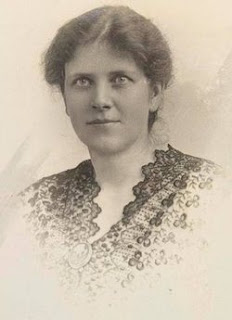Helena Mabel Checkley Forrest was born on 6th March 1872, near Yandilla, Queensland (now part of Toowoomba Region), the daughter of James Checkley Mills and his wife Margaret Nelson, née Haxell, who was educated in France and Germany. She began writing at an early age.
Mabel also lived in Goondiwindi, Dalby and later Townsville and Charters Towers. The publication of her first volume of poems, “Alpha Centauri”, in Melbourne in 1909, founded Mabel’s reputation as a poet. Her first novel “A Bachelor's Wife”, was included in the Bookstall series in 1914. “The Green Harper (prose and verse) followed in 1915, and “Streets and Gardens”, a collection of verse, in 1922. Several of Mabel’s short stories were translated into Dutch and published In Holland. Starting when she was seven years old, Mabel won a total of 14 prizes in literary competitions. She also wrote poems and short stories for various newspapers and magazines.
Mabel died of pneumonia on 18th March 1935 in Brisbane, after a long illness. She was married twice – her second husband was John Forrest - and was survived by a daughter.
"Lydia Grant, V.A.D." - a poem by M. Forrest published in the “Sydney Mail”, newspaper, Wednesday, 18 April 1917, Page 28, in memory of Lydia Grant, V.A.D. The first Australian V.A.D. to go from Queensland, who died while serving as a nurse in WW1 in Manchester, UK in 1917 and was buried in Manchester Southern Cemetery.
 |
| Lydia Grant VAD |
Who faced twin foes, Exhaustion and Disease,
And all the active horrors brought by war
To our great Motherland across the seas,
And faltered not where she her duty saw.
SO young
To lay aside life's riches, with the cup
Scarce at your lips. Brown hair and steadfast eyes,
You look to-day from gates of paradise,
While we weep and look up.
DARE we
Beat at the outer ramparts of heaven's bars
To send our wailing thro' your radiant chant?
Your white feet find their homeland in the stars,
The girl who died for England— Lydia Grant.
“Boy-Dreams”
I was a Pirate once,
A blustering fellow with scarlet sash,
A ready cutlass and language rash;
From a ship with a rum-filled water-tank
I made the enemy walk the plank;
I marooned a man on an island bare,
And seized his wife by her long, dark hair;
Took treasure, such heaps of it! — wealth untold —
Bright bars of silver and chunks of gold!
Till my ship was choked to the decks with pelf,
And no one dare touch it except myself
And my black flag waved to the tearing breeze,
And I was the terror of all the seas!
I was a Fairy once.
I swung in the bows of the silky oak,
And the harebells rang to the words I spoke,
And my wings were fashioned of silver gauze,
And I knew no grief and no human laws.
And I lived where the laces of green leaves sway.
And my life was one long, long holiday.
No tasks to learn, and no bothering rules,
No hectoring grown-ups, and no—more—schools;
But a dance each eve, ’neath the moon’s cold light,
To sit up as late as I liked at night. . . .
For a lance I carried a grass-blade green,
And my shield was cut from an olivine;
I sipped cool dews from the cups of flowers,
My days were threaded of happy hours!
I was a Merman once.
In the gloom of the amber-tinted seas,
With the brown tang clinging about my knees,
With a coral house, and a crab to ride,
Who pranced, and who ambled from side to side;
I wooed a Mermaid with emerald hair,
Dragged the fierce sea-serpent from out his lair,
With his flaming tongue and his awful might,
And I slew him — easy — in open fight!
I had strings of pearls, white as frozen milk,
That were strung for me on sea-spider’s silk;
And I never pined for the upper skies,
Whose blue came down in the dead men’s eyes,
Drowned men with the salt on their blackened lips,
Who slid, drifting in, from the wrecks of ships;
But I took the gold from the belts of all,
To pave the road to my coral hall.
I was a Hunter once,
And I trapped and stalked in a pathless wood,
And the talk of the wild things understood.
With my leather leggings and hat of brown.
I tracked the elk and the redskin down;
Slew a grizzly bear in a mountain cave,
And tweaked the nose of an Indian brave.
Ere I shot the rapids in birch canoe —
For there was nothing I could not do.
There was naught I did not dare or enjoy,
In the magic world of a dreaming boy!
Sources: Mabel’s Obituary in “The Mercury” Tue 19 Mar 1935 (Hobart, Tas.: 1860 - 1954)
https://web.archive.org/web/20030324190334/http://whitewolf.newcastle.edu.au/words/authors/F/ForrestM/verse/AlphaCentauri/boydreams.html
https://en.wikipedia.org/wiki/Mabel_Forrest






